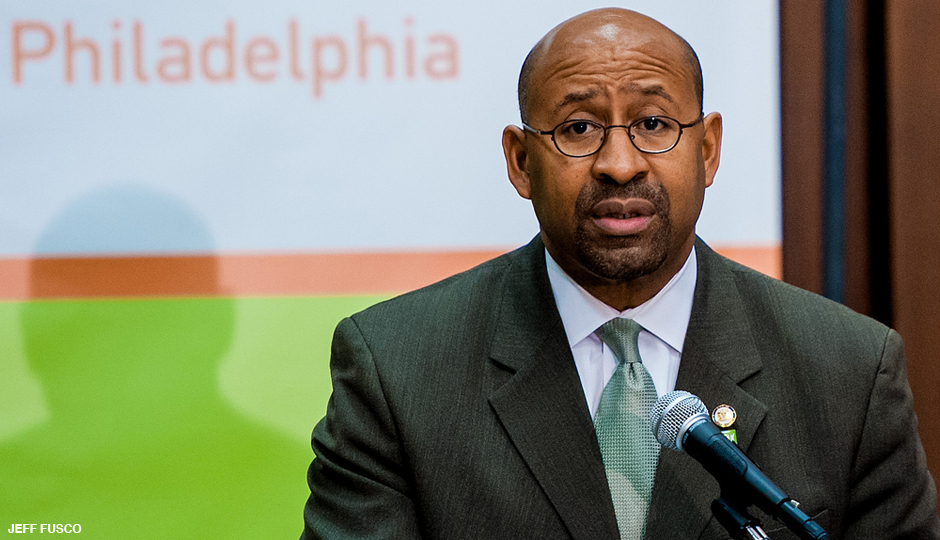The Brief: Mayor Nutter’s Last Tax Hike Is a Whopper

Photo | Jeff Fusco
When Michael Nutter was sworn-in, waaaay back in 2008, the assumption in Philadelphia’s tax-cutting crowd was that one of their own was in the mayor’s office. After all, this was the guy who, in 2002, had handed hard-nosed Mayor John Street one of his most humiliating defeats by assembling a City Council coalition that forced the administration to resume wage tax cuts that Street wanted to stall. Even newly-minted councilman Darrell Clarke, Street’s protege, voted with Nutter on that one.
And yet, despite that legacy, and despite those expectations, Nutter will introduce a budget this morning (so long as the snow doesn’t intervene) that includes yet another whopping proposed tax hike: 9.3 percent on the real estate levy.
If City Council goes along with it, this will be the fourth property tax hike on Nutter’s watch. Then there’s the “temporary” (actually permanent) sales tax hike. The tax on cigarettes. Not to mention the other taxes/fees that Nutter sought but failed to get. The soda tax. A higher liquor-by-the-drink tax. A trash collection fee.
These Michael Nutter tax hikes say some interesting things about the man, much of it contrary to public understanding of him.
- Nutter firmly believes the City of Philadelphia has a civic responsibility to fund its school system, despite the state takeover back in 2001. On his watch, local funding has increased substantially while state funding has flatlined, and federal funding has precipitously declined. That fact alone explains most of his proposed tax hikes. Nutter has taken some serious political beatings advocating for cash for city schools, at significant cost to his own political future. Yes, City Council approved/changed many of his plans. But politically, Nutter owns all these tax hikes. That takes some real political courage.
- There’s a deep-seated belief among city workers that Nutter couldn’t care less about them. It’s a misguided conviction. During the recession, when his big city mayoral peers were laying off municipal workers at an alarming clip, Nutter was making ends meet with unpopular tax hikes and employee attrition. He was pilloried by the unions for his hardline stance on contracts. But let’s remember that union leaders would by and large rather see layoffs of a minority of members than endure stagnant or reduced wages and benefits for all members. But is that tradeoff actually in the best interest of city workers overall? Is it in the best interests of the city as a whole? My point is, the caricature of Nutter as uncaring of city workers rings pretty false, given his record of raising revenue while his mayoral peers laid off thousands.
- Nutter’s tax policy these last seven years actually reflects a slow-motion, and politically feasible (because hey, it’s happened) implementation of tax reformers long-held dream of reducing wage taxes while raising property taxes. For city residents, the wage tax is down 7.1 percent, and scheduled to decline again next fiscal year. Property taxes, meanwhile, keep rising. Sure, the tax reform crowd would like to have seen bigger declines in the wage tax. Yes, those business tax cuts (also favored by the tax reformers) that we’ve seen have been driven by City Council, not the administration. But overall, property taxes now account for about 19.1 percent of total tax revenue (and that doesn’t include Nutter’s proposed tax hike next fiscal year). When he took office, property taxes covered about 16.8 percent of the budget. It’s not rapid change, but it is change.
Setting aside policy for a moment, this will be Nutter’s final major schedule address to City Council—his swan song. It will be fascinating to hear what he says.
Don’t Miss…
- Yesterday’s launch of Philadelphia 3.0, a dark money outfit aiming to bring some fresh blood to City Hall, raises some difficult questions. Like: Are you ok with anonymous donors if their cash shakes up Council?
- Joel Mathis breaks down schools Superintendent Bill Hite‘s new action plan for the district, which includes more autonomy for high-performing district schools, limiting charter expansion to takeovers of low-performing district schools and further decentralization of district management. (Public schools advocate and at-large City Council candidate Helen Gym is not impressed)
- Breaking! A Philadelphia mayoral candidate—Anthony Williams—releases a (somewhat) detailed and (somewhat) plausible plan for funding city schools.
- A strong case for more curbside parklets in this article from Jon Geeting at PlanPhilly, grounded in this report from the University City District. Always gratifying to see data that confirms what you know to be obviously objectively true: parklets are just obviously awesome.
- The Inquirer spends a day with mayoral candidate Lynne Abraham.